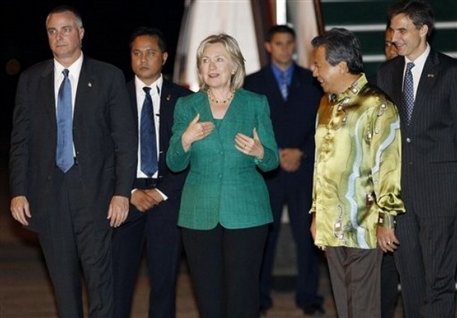
While her husband and many of her administration colleagues are out on the campaign trail, Secretary of State Hillary Clinton is on the other side of the world on Monday, beginning a three day visit to Malaysia - the first bilateral visit to the nation in fifteen years.
A number of issues will be on the table during her time there - not the least of which, of course, is China and America's interests in the region in the wake of the ASEAN summit. Clinton has specifically denied to the local press that the U.S. seeks to "contain" China, but it never hurts to reach certain understandings.
Besides the normal security discussions, economic interests will also be a prominent concern. As the Wall Street Journal recently noted, the rebounding export market and domestic consumption have outpaced expectations, and the key now is to reinvigorate private investment - which Malaysia can probably attract via continued transparency reforms, anti-corruption efforts and moving the oft-cited affirmative action policies toward a merit-based solution. Attracting more private investment doesn't require these steps, but they'd grease the skids.
Yet Clinton's visit also brings up a broader signal as well as a need for engagement in the context of more long-term interests. Robert Kaplan raised a similar issue in a Los Angeles Times piece last week concerning the effects on Islam of market globalization:
Yet this new, postmodern Islam with a hard Middle Eastern edge is ramming up against another import: the glitzy materialism that in Malaysia and Indonesia is associated with nominally communist China. This is the real "clash of civilizations" going on. Americans thought they owned the face of global capitalism after the collapse of the Berlin Wall; it turns out that in Islamic East Asia, the Chinese do. Ethnic Chinese own many of the spanking new malls packed with Louis Vuitton, Versace and other designer stores, the places to observe women in the most fashionable silk jilbabs and the most revealing, sophisticated dress. In Muslim Southeast Asia, modesty often stops at the neck.
Malaysia's path as a developing nation is one that seems all the more important in the context of the continued clash around the world concerning our views on radical Muslims and the pursuit of true moderates. The recent arrest of the would-be Metro bomber in Northern Virginia, the UPS plane bomb threat and other incidents are all present in the minds of many American voters this week. That is, sad to say, the face of Islam for many Americans.
If U.S. engagement with moderate Islam is to have a future, that future may well be in Malaysia and other pockets of the Muslim world that have turned to embrace global capitalism. And if the face of Islam in America is going to become more moderate and approachable, then I suspect it will take more than just bilateral talks once every decade and a half.
(AP Photo)



